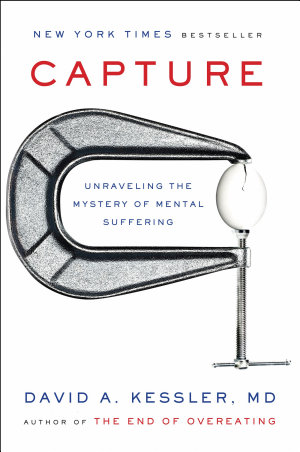Capture: Unraveling the Mystery of Mental Suffering
by: David A. Kessler, M.D.
Book review by Sandy Hannant
In his book “Capture”, Dr David A. Kessler explains the ramifications of mental illness by breaking it down to one word: Capture. Capture is described by Dr. Kessler as a process when something captures our thoughts, feels unmanageable and affects our actions.
The theory of capture is compelling because it enables those suffering with mental illness to try and apply some change over their unhealthy thinking. The author explains that capture is: psychosis, ideology, violence, addiction, anxiety and depression.
The book explains examples of what can cause capture: rejection, abusive parents, alcohol, gambling, physical pain, childhood trauma, love, death, drugs control, abandonment, going mad, religion, self-criticism, self-harm, making obscene phone calls, and delusion of grandeur. The book points out that mediation and mindfulness may help people escape from negative capture. The author further explains that capture is what occurs when our minds feel like they have been taken by something we cannot deal with. When we feel like our mind has been captures by something and we become centered on it until it becomes a fixation that gains control of our thoughts, we then become captured by those thoughts and we cannot break away from its grip on us.
Dr. Kessler believes the addictive thoughts which influence patterns of addiction, which exist in depression, post-traumatic stress disorder, mania and obsessive compulsive disorder cause terrifying behavior. He explains that the brain takes charge and when this happens depression and other mental illnesses occurs. He says, “depression is an exercise in torment that is entirely focused on the self. Any lasting solution requires a redirection of attention elsewhere”. Specifically, when we are depressed we cling to negative thinking because negativity causes so much anguish and we can’t sever our thoughts away from them. If we become overpowered with a thought or belief our reasoning is channeled through that obsession, strengthening it.
Capture is basically a hang up often repressed from one persons action that changes their behavior. It materializes into an obsession and then the brain captures feelings that are difficult to absolve.
The idea that we obsess on thoughts and that obsession can become addictive is not a innovative concept. This book brings this idea (being captured by thoughts and behavior which we won’t exonerate because we cannot absolve them) into a fuller, more broad and profound perception.
To better understand capture, the strongest and most effective step is comprehension. If we understand what is occurring, the reason why it is developing in our minds, and we can define it, we then may be able to be set free from the grip of capture.
With mental illness there is often a matter of opinions as to whether a problem is brought about from an imbalance in the brain, ineffective order of understanding or a distressing social environment. The book has introduced different concepts into a understandable frame of reference.








 sending...
sending...